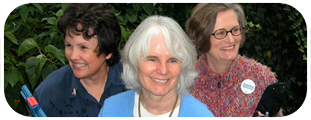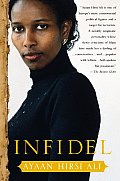As I walked up the aisle after listening to the second of two evenings with Alex Steffen, I knew I was witnessing a moment that led to the future. A kind looking woman about my age remarked that she'd been to listen to Abby Hoffman back in the day and felt this evening, like that one years ago, was a milestone in the nation's history.
It was like that, people talking to strangers, wanting to share notes, get confirmation that others felt like they too had bumped into the new, new thing, that there is hope.
Alex and His Story
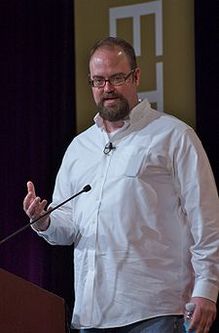
Alex Steffen is a bright Seattle light who is more known in other places, I'd guess, than here, at least until now.It might be an age thing. No one I talked to about going to this had heard of him.I'd read WorldChanging.org a few times so I at least knew who he was although I hadn't been a blog groupie. I suspect I will be from now on out. Steffen co-founded the site and edits it and the 600-page book by the same name, "Worldchanging". He is this era's Buckminster Fuller, alive in an era where the technology can move things along more quickly and in a time where we have a huge need for people to articulate what's happening and then lead us in the right direction. We haven't much time and there is much resistance.
Luckily, this man knows how to tell a story.And it's a catchy one - the story he is telling is the story about our survival as a species. He gives us facts about how the world is now (on that "worst case scenario" path, basically) and about what needs to happen to forgo certain calamity. Think I'm joking?Afraid not. His talks were both sobering and, strangely, optimistic - an analysis of the state of the physical, cultural and political earth right now, the slippery slope we are headed down and the "bright green" options that we can choose to pull ourselves out of what would otherwise be total collapse. He provides a goal and a timeline - drop our net per capita greenhouse gas emissions to nothing by 2030.We need a model of how to live that is climate-neutral, non-toxic, closed loop and ecologically restorative .That model has to be up and running in the developed world by 2030 and then widely adopted globally by 2050.
That will wake one up. And, the world is listening to him.Steffen is speaking twice in Copenhagen, once to the world's mayors, the other to businesspeople.
Women's Rights is the Key Sustainability Technology
Here's an example of his ability to tell stories and weave stories together. He managed to link the two issues I am most passionate about: climate change and the criticality of changing women's lives for the better around the globe. Women's rights are the most powerful sustainability technologies that we have. He says it's critical to the future of sustainability and our planet that we educate girls and give women property rights, legal protection and job opportunities. They will have fewer children and those children will be better taken care of.Sustainability is fundamentally about making sure that all kids have a wonderful childhood. How cool is that for something we might be willing to work for and, in addition, it saves the planet?
Going Beyond Sprawl
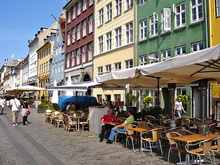
Suburban sprawl is our Travant, that sad little car that got the East Germans through the 50's and 60's and 70's and 80's and then, when the wall fell, they saw how far behind everyone else they were. The technology that they thought was up-to-date turned out to be a costly, heavy dinosaur. Density is our goal - well-designed, community-oriented density. Dense places around the globe require less energy and give off less CO2. And the people who live in dense, well-designed cities, like Copenhagen, are much happier.
The Introducers
Did I mention that Richard Conlin, famously liberal city council member, just re-elected with enough votes to be Council President again, introduced Alex the first evening? Or that newly-elected mayor Mike McGinn introduced him the second night? Or that there was a large crowd of young people in attendance? There's a movement afoot, me thinks. On a side note, McGinn took the opportunity of his first appearance after the results were known to share his observations with us:
1) People want something different and they are willing to work to get it. A lot of people came into contact with Mike McGinn and decided they wanted to volunteer on his campaign. They liked that McGinn listened to them and that he thought that together they could solve the problems they see.
2) The voters shaped McGinn because they want to shape the future. They want good jobs, safety, especially for their children and a way for their children to advance in the world.
3) People won't help you solve the problems of the future unless you are helping them solve their problems of today.
Then McGinn said something about Alex in introducing him that I hope we can say about McGinn in a year. Alex understands that to get to the future, you have to offer people hope.

This is the Seattle Moment
After the first evening's overview and the second evening's introduction by McGinn, Alex talked about Seattle and how we could lead the nation and the country into a sustainable future. He said this was a really important time and place. We need to come up with a level of prosperity that doesn't ruin our planet.He also noted that there is an enormous advantage for being the people and place that does this first.
First he debunked Seattle's reputation for being the city in the sky, the place where everything works and we live ever-so-well. He said in reality that Seattle is in a sprawling, poorly built region and the city itself is poorly designed - too many cars, bad building, and too much stuff. It's only because of our region's rain and mountains and the hydro power we get from that accident of nature that we appear to have a higher level of sustainability than other places. Take that away and we're like everywhere else.
But, he pointed out, we gain a lot from having this reputation.Let's use it.
Density, Young People and a Car-free Urbanism
So, how do we become a carbon-neutral city? Well, we begin by becoming denser. Alex thinks the population of Seattle will double in 20 years because our climate is likely to be more stable than it is in other places, young people will want to come here (although we've got a lot of competition from Portland) and we will have figured out the trick of being both sustainable and prosperous.
Then we aim for car-free urbanism. He says we should judge every new development by that standard. Does it work for people without cars? A vital street life becomes our second living room. I am really liking this.
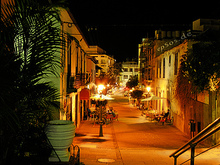
Alex went on to talk about the advantages of our ambient technology, which is changing the way we live, use things, understand the world and get active in it. He mentioned a site in Europe that began posting information about who the farm subsidies went to in the EU. The information had been terribly difficult to access. Once the website, farmsubsidy.org, began making it available, all hell broke loose.
Alex talked about how we turn all that technical capacity and cultural enthusiasm toward the civic realm.I had to laugh when this video came out from Mike McGinn and his transition team the next day because this is exactly the kind of thing that comes to mind. And this is why I think we are in for a much needed revolution in this city, an exciting and perhaps sometimes bumpy one.
He ended by saying that democracy is about showing up .And, we just saw what can happen when people show up in the civic realm, twice in the last year. Then, perhaps my favorite saying of the evening: Bureaucracies use boredom like skunks use smell. It's how they keep people away. If we're going to beat them, we're going to have to create our own civic infrastructure. And it's going to have to be fun. If boredom is their weapon, fun is ours.
Come on, Seattle. This is our time!
